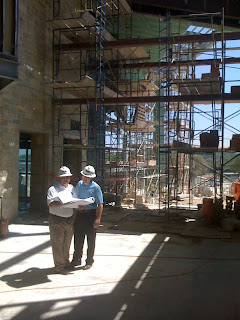In response to the post,
"A Conversation with One of the Smart Guys," a reader writes:
“I am in GP and very proud to be a part of it. At the end of May, I was sitting in a meeting with other teachers from other GP schools. One teacher went off on LYS and asked to see the research and why it is so important. Another person said the same thing. In fact, I am pretty sure that (he or she) said, "I have asked to see the research on its effectiveness, but was told to be quiet and never ask again." That is not verbatim, but close. Look at the growth that GPISD has had in the last 3 years. Right there is a validation of the research!!! What LYS and GPISD is doing, IS WORKING!!!”
SC Response
As you (and the majority of the GPISD staff) have proven, all it takes is the courage to let go of the stale practices of habit and embrace small changes that pay big dividends in student performance. Kudos to you.
The “research question” is the biggest crock of malarkey you can image and is simply a tool that the naysayer uses to stop change. The research is not secret, as we point out and share over and over again. LYS practices are entrenched in the works of Schmoker, Marzano, DuFour, Fullan, Schelecty and Caulkin just to name a few. Then, just as you have done, we point to the work of LYS that has been validated in the field over and over again. All the naysayer has to do is read a book and/or look at the data.
As for the the statement, “I was told not to ask.”
Again, made up garbage by someone who doesn’t want to change at a pace that is beneficial for students. One reason why LYS and GPISD works well together is because GPISD leadership is constantly is looking for the answers to the qestions, "what works, how do we know it and how do we start doing it?" As does LYS.
Plus, there is the blog. As regular readers know, I (and by extension LYS and the LYS Nation) will discuss any topic and address any concern that is brought forth in this forum. As I have written before, this is a forum of ideas and may the best idea win.
So when someone is throwing stones, consider the following options:
1. Say nothing. Often just knowing that you are right and they are wrong is enough.
2. Ask them to explain away the data that shows that things are improving.
3. Ask them if they have actually had a conversation with me or any of the LYS coaching staff. We are easy to find.
Regardless, don’t let the naysayers slow you down. In the short run, a little skepticism is healthy. In the long run, the continuous improvement and success of you and your students will either convince them to change or convince them to leave. Either way, their students win.
Think. Work. Achieve.Your turn...





